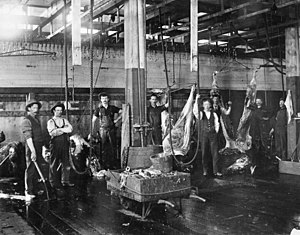The job of selling farm products, wrote an analyst for the U.S. Department of Agriculture, has become a matter of “art and psychology” because Americans, increasingly city born and raised, know nothing about “the origin and real character of food and food products . . . .”
These days, consumers are “especially susceptible to suggestion; they are governed largely by appearances in their selection of farm products and are easily deceived by the trick of a false name or a false ingredient in a prepared food."
Slap the word “Canada” on a package of lamb, for example, and a butcher can earn “2 cents more per pound for it,” paid out by “customers who act under the delusion that they are getting something unusual for their money. In certainly 95 per cent of the cases they are getting plain domestic 'lamb,' and about 50 times out of 100 are not getting lamb at all, but mere mutton.' (423) So, too, sausage makers: slap the words "country sausage" on the package, and customers will pay more. (423) “The fictions seem to sell the product, and the eating public appears to be satisfied.”(423)
“Farmers should learn [these] whims and fancies of the markets . . . . By so doing the highest prices and the largest profits may be obtained.” (433)
________________________
"Consumers' Fancies," by George K. Holmes, from U.S. Department of Agriculture Yearbook, 1904, pp. 423, 433.

